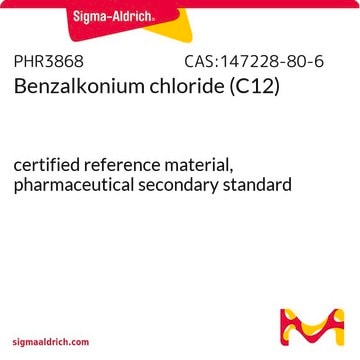13371
Benzyldimethyldecylammonium chloride
≥97.0% (AT)
Synonym(s):
Benzyldecyldimethylammonium chloride
About This Item
Recommended Products
Assay
≥97.0% (AT)
form
powder
mp
50-60 °C
SMILES string
[Cl-].CCCCCCCCCC[N+](C)(C)Cc1ccccc1
InChI
1S/C19H34N.ClH/c1-4-5-6-7-8-9-10-14-17-20(2,3)18-19-15-12-11-13-16-19;/h11-13,15-16H,4-10,14,17-18H2,1-3H3;1H/q+1;/p-1
InChI key
TTZLKXKJIMOHHG-UHFFFAOYSA-M
Looking for similar products? Visit Product Comparison Guide
Related Categories
General description
Signal Word
Danger
Hazard Statements
Precautionary Statements
Hazard Classifications
Acute Tox. 4 Oral - Aquatic Acute 1 - Aquatic Chronic 1 - Eye Dam. 1 - Skin Corr. 1B
Storage Class Code
8A - Combustible corrosive hazardous materials
WGK
WGK 2
Flash Point(F)
Not applicable
Flash Point(C)
Not applicable
Personal Protective Equipment
Certificates of Analysis (COA)
Search for Certificates of Analysis (COA) by entering the products Lot/Batch Number. Lot and Batch Numbers can be found on a product’s label following the words ‘Lot’ or ‘Batch’.
Already Own This Product?
Find documentation for the products that you have recently purchased in the Document Library.
Customers Also Viewed
Our team of scientists has experience in all areas of research including Life Science, Material Science, Chemical Synthesis, Chromatography, Analytical and many others.
Contact Technical Service













